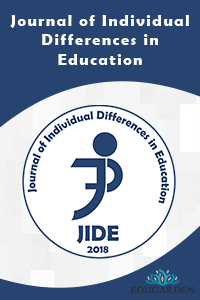Öğretmenlerin Web Tabanlı Mesleki Gelişime Yönelik Motivasyon ve Web Tabanlı Öğretime Yönelik İnançlarının Çeşitli Değişkenler Açısından İncelenmesi
Bu araştırmanın amacı öğretmenlerin web tabanlı mesleki gelişime yönelik motivasyonlarının ve web tabanlı öğretime yönelik inançlarının yaş, branş, kıdem ve cinsiyetlerine göre farklılık gösterip göstermediğini incelemektir. Bu amaç doğrultusunda araştırma kesitsel tarama modelinde yapılmıştır. Araştırma 2016-2017 eğitim öğretim yılı birinci döneminde Sakarya, Zonguldak ve İstanbul illerinde Milli Eğitim Bakanlığına bağlı devlet okullarında görev yapan 253 öğretmenin katılımıyla gerçekleştirilmiştir. Öğretmenlerin 137’si kadın 116’sı ise erkektir. Araştırmada veri toplama araçları olarak Kao, Wu ve Tsai (2011) tarafından geliştirilen ve Çakır ve Horzum (2013) tarafından Türkçeye uyarlanan “web tabanlı mesleki gelişime yönelik motivasyon ölçeği” ve Yang &Tsai (2008) tarafından geliştirilen ve Horzum ve Canan Güngören (2012) tarafından Türkçeye uyarlanan “Web Tabanlı Öğretime Yönelik İnanç Ölçeği” kullanılmıştır. Araştırma sonucunda öğretmenlerin web tabanlı öğretime yönelik inançlarının düzeylerinin cinsiyet, yaş, kıdem ve branşlarına göre anlamlı farklılık göstermediği ortaya çıkmıştır. Ayrıca öğretmenlerin web tabanlı mesleki gelişime yönelik motivasyonlarının yaş, kıdem ve branşlarına göre anlamlı farklılık göstermediği ancak cinsiyetlerine göre incelendiğinde ise kadınların web tabanlı mesleki gelişime yönelik motivasyon düzeylerinin erkeklere göre daha fazla olduğu görülmüştür.
Anahtar Kelimeler:
Uzaktan eğitim, mesleki gelişim, web tabanlı öğretim
The investigation of teachers ‘motivations on web based’ professional development’ and ‘ the belief of the belief for web based teaching’ by various variables
The aim of this study is to examine whether teachers’ motivation for webbased professional development and their beliefs about web-based teaching differ according to age, branch, seniority and gender. For this purpose, the study was carried out in a cross-sectional survey model. The research was conducted with the participation of 253 teachers working in state schools affiliated to the Ministry of National Education in Sakarya, Zonguldak and Istanbul in the first period of 2016-2017 academic year. 137 of the teachers and 116 of the women are men. It was developed by Kao, Wu, and Tsai (2011) to measure teachers’ motivation for web-based professional development. The measurement tool adapted to Turkish by Cakir and Horzum (2013) was developed by Yang and Tsai (2008) and Horzum was used to measure their beliefs about web-based teaching. The measurement tools adapted to Turkish by Canan Gu¨ngo¨ren (2012) were used. As a result of the research, it was revealed that the levels of teachers’ beliefs about web-based teaching did not show a significant difference according to gender, age, seniority, and branches. In addition, when the motivations of teachers towards web-based professional development did not show a significant difference according to their age, seniority, and branches but examined according to their gender, it was seen that the motivation levels of women towards web-based professional development were higher than men.
Keywords:
distance education, professional development, web based teaching,
___
- Beşoluk, Ş. ve Horzum, M. B. (2011). Öğretmen Adaylarının Meslek Bilgisi, Alan Bilgisi Dersleri ve Öğretmen Olma İsteğine İlişkin Görüşleri. Ankara Üniversitesi Eğitim Bilimleri Fakültesi Dergisi, 44(1), 17-49.
- Çakır, Ö., ve Horzum, M. B. (2014). Adaptation Motivation toward Web-based Professional Development Scale and Examining Pre-service Teachers Motivation toward Web-based Professional Development Perception in Terms of Different Variables. Procedia-Social and Behavioral Sciences, 131, 144-148.
- Çetin, Oğuz. (2012, Aralık). WEB Tabanlı Öğretim ve WEB Tabanlı Öğretimde Kullanılabilecek Örnek Bir İçerik Tasarımı. Erişim tarihi: 17Aralık 2016, http://www.oguzcetin.gen.trHorzum, M. B. (2012). The Effect of Web Based Instruction on Students’ Web Pedagogical Content Knowledge, Course Achievement and General Course Satisfaction. Çukurova University Faculty of Education Journal, 41(1), 36-51.
- Horzum, M. B. (2013). An Investigation of Pre-Service Teachers’ Web Pedagogical Content Knowledge with Respect to Department and Gender. Journal of Teaching and Education, 2(3), 161–167.
- Horzum, M. B., ve Canan Güngören, O. (2012). A model for beliefs, tool acceptance levels and web pedagogical content knowledge of science and technology preservice teachers towards web based instruction. Turkish Online Journal of Distance Education, 13(3), 50-69.
- Kao, C. P., Wu, Y. T. ve Tsai, C. C. (2011). Elementary School Teachers’ Motivation Toward Web-Based Professional Development, and the Relationship with Internet Self-Efficacy and Belief about Web-Based Learning. Teaching and Teacher Education, 27, 406-415.
- Kao, C. P., ve Tsai, C. C. (2009). Teachers’ Attitudes Toward Web-Based Professional Development, with Relation to Internet Self-Efficacy and Beliefs about Web-Based Learning. Computers & Education, 53, 66e73.
- Başak, S., Kıngır. S. ve Yaşar, Ş. (2013) Kadının Görünmeyen Emeği: İkinci Vardiya (Anka Kadın Raporları No. 13-1). Ankara, Ames Matbaacılık
- Şahan, H. H. (2005). İnternet Temelli Öğrenme. Ed: Özcan Demirel, Eğitimde Yeni Yönelimler, (s.223-234). Ankara: Pegem A Yayıncılık.
- Büyüköztürk, Ş., Çakmak Kılıç E., Akgün Ö. E., Karadeniz Ş., ve Demirel F. (2016). Bilimsel Araştırma Yöntemleri. Ankara: Pegem Akademi.
- Treacy, B., Kleiman, G. ve Peterson, K. (2002). Successful Online Professional Development. International Society for Technology in Education, 30(1), 42–47.
- Yang F. Y. ve Tsai, C. C. (2008). Investigating university student preferences and beliefs about learning in the web-based context. Computers & Education, 50, 1284–1303
- Öncü, H. (2004) Motivasyon. Küçükahmet, L. (Ed.). Sınıf Yönetimi, Nobel Yayınevi, Ankara
- ISSN: 2667-8691
- Yayın Aralığı: Yılda 2 Sayı
- Başlangıç: 2019
- Yayıncı: Edugarden Org. Kongre Ve Yay. San. Ve Tic. Ltd. Şti.
